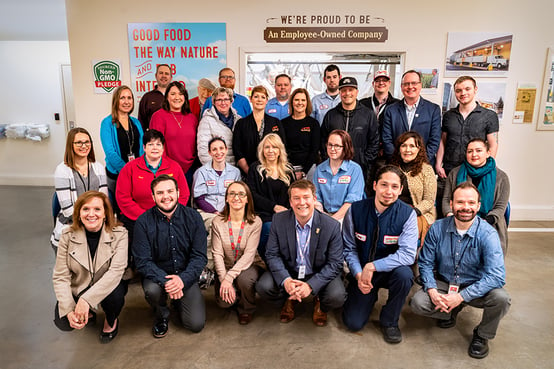At Highlight, we’re on a mission to help companies build better products for people and the planet. It’s important to us that brands have the consumer insights they need to build eco-friendly products that shoppers will feel great about buying again and again.
That’s why this Earth Month, we are excited to celebrate some brands that are mission-driven and committed to bringing more sustainable products to consumers.
To learn more about what today’s consumers think of sustainable products, read our exclusive report: Sustainability in Consumer Products: A Closer Look at Generational Preferences.
For more information on the brands that are helping consumers make more sustainable purchase decisions, read on below:
Atlantic Sea Farms
Atlantic Sea Farms is a woman-run, mission-driven seaweed farming company, dedicated to making a positive impact on the health of shoppers, coastal communities, and the planet.
They’re doing this by creating delicious products made from regeneratively farmed sea greens.
Seaweed, as it turns out, is a multipurpose product. Their retail products include everything from veggie burgers and spicy gochujang seaweed salad to smoothie supplements and dried kelp for snacking.
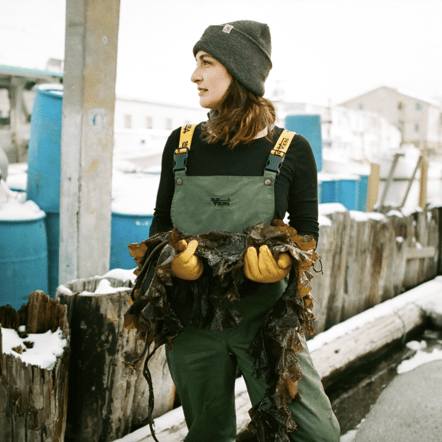
But seaweed’s utility doesn’t stop there. Kelp is what’s known as a keystone species. In other words, its presence in an ecosystem helps other species thrive. Atlantic Sea Farms’ offshore kelp farms give shellfish, aquatic birds, seals and more a source of nutrients. It helps mitigate the warming and acidification of our ocean. It also provides a source of income for the communities that have lived on our coasts for generations.
You can learn more about their mission, their operations, and their products on the Atlantic Sea Farms website.
Poseidona
Meanwhile, on the other side of the Atlantic, another woman-run startup is finding other ways to heal our oceans and produce healthy products consumers love.
Barcelona-based Poseidona harvests invasive seaweed and algal side-streams (runoff from agricultural producers) to create healthy proteins similar to soy through a process called enzymatic hydrolysis.
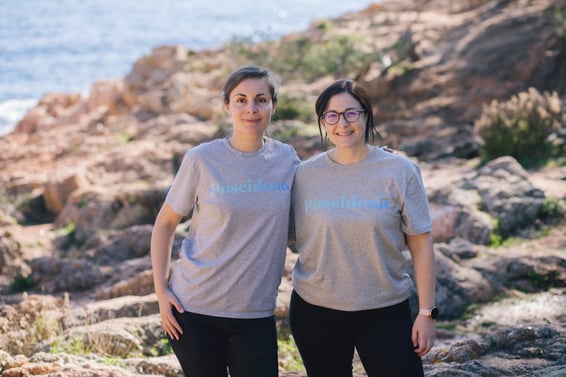
The founders, Sònia Hurtado and María Cermeño, are putting their advanced STEM degrees to good use: María has a doctorate in food biochemistry, and Sònia was previously co-founder and chief scientific officer at Current Foods.
You can learn more about this innovative brand on TechCrunch.
Aloha
Aloha is an employee-owned Certified B Corp and Climate Neutral Certified company that makes organic vegan protein products like powder and snack bars. As you might guess from their name, they work with sustainable farms across Hawai’i, and work closely with Kupu, Hawai'i’s leading youth-focused conservation non-profit, whose service, education and workforce development programs help the next generation of environmental stewards become leaders in their communities.
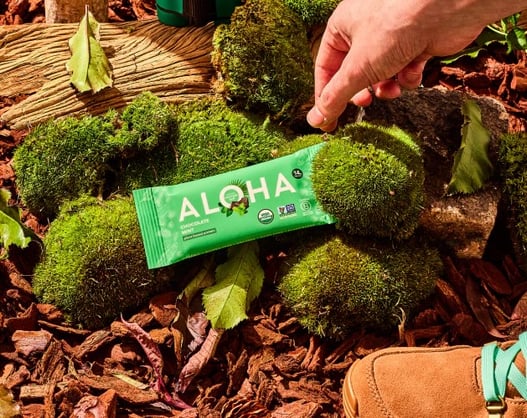
In March 2024, Aloha received an important vote of confidence: SEMCAP, a growth equity investment firm focused on identifying and helping build purpose-driven food and nutrition brands, invested $68 million of secondary capital to buy out early angel investors and take a significant minority stake in the company.
Ahola CEO Brad Charron celebrated this milestone, explaining that this move will support their “mission to make simple, nutritious food accessible to everyone, while using our business as a force for good.”
You can explore their products and learn more about their mission on the Aloha website.
Suja
Suja Organic offers a line of USDA organic certified, non-GMO products that deliver fruit and vegetable nutrients in a convenient bottled or powdered form, including cold-pressed juices, wellness shots, and nutrient powders.
The most recent addition to their product line is a collaboration with food technology company Treasure8. Treasure8’s patented USDA Sauna dehydration technology adds circularity to Suja’s production process by upcycling waste streams from Suja Life’s ready-to-drink products into their premium powders.
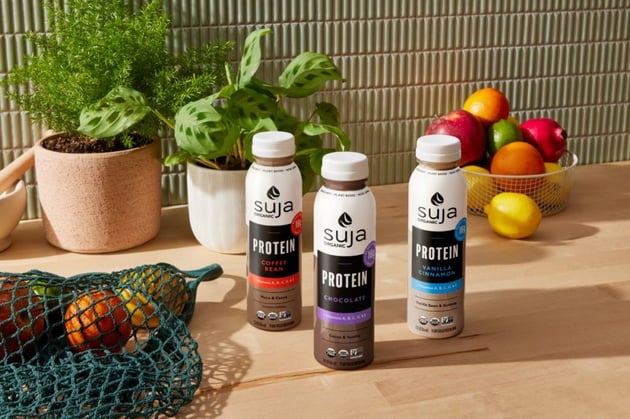
This innovation not only reduces waste, but also decreases production time, cost, energy use, and carbon dioxide emissions–the kind of win-win CPG brands are aiming for in their sustainable product development.
Learn more about Suja and their partnership with Treasure8.
Verb Energy
Verb Energy’s caffeinated protein bars are an excellent example of the ways sustainable and better-for-you products can come together to give consumers the products they’ve been looking for.
The Verb Energy team works hard, not only to build sustainability into their supply chain, but also affect systemic change in the food and beverage industry. At New York Tech Week 2023, Verb Energy co-founder and COO Bennett Byerley shared in detail the steps they take to build better products for the planet and help their consumers understand the impact they make. You can watch the whole panel, or catch a sneak peek below.
You can learn more on the Verb Energy website or find their products at your favorite retailers like Target, Costco, Albertsons, Kroger and more.
Toad&Co
According to an audit conducted by the UK House of Commons in 2019, global textile production contributes more to climate change than international aviation and shipping combined.
11 Considerations for Apparel Brands to Improve Their Wear Testing
That’s a stunning metric to consider. It also makes brands like Toad&Co so important. They use a minimum of 80% sustainable fibers and fabrics to meet bluesign and OEKO-TEX standards. They’ve also committed to removing all plastic-based packaging from their products by 2026.

Perhaps most importantly, they’ve dedicated a section of their ecommerce site to resale. This online thrift store allows fans of the brand to shop and sell their pre-loved pieces and give them a second life and keep them out of landfills, longer.
You can learn more about Toad&Co on their guide to avoiding greenwashing.
Reformation
Reformation’s commitments to sustainability are thorough. They measure important metrics like their water impact and land use. They are transparent about the regenerative and recycled fibers they use to construct their apparel. They also adhere to bluesign and OEKO-TEX standards, and test their products against the Restricted Substance List.
We also love the copy they use to outline all the details of their sustainability commitments:

You can dive into all the details of their sustainable operations on the Reformation website.
Levi's
Levi's tagline "quality never goes out of style" is an important reminder of what makes a product truly sustainable: the kind of product that you'll use again, and again, and again.
Levi's are famously built to last (as their ad above for 501's worn through the generations demonstrates). If you're not lucky enough to have inherited an iconic pair from combing through your parent's closet or discovering a perfectly worn-in pair on consignment, Levi's is here to help you "buy better, wear longer".
You can learn more about Levi's environmental initiatives, quality construction, and commitment to circularity in the denim industry at their website.
Learn more from Highlight's
Consumer Report: Generational Preferences for Sustainable Products
Madewell
If you love Madewell’s jeans, then you’ll love their denim recycling program. Madewell’s recycling program not only accepts your old Madewell jeans, but denim of any sort–and gives you $20 to spend on your next pair of Madewell jeans.
In 2023, Madewell’s denim recycling program collected 1.5 million pieces, diverting the equivalent of 3.2 million square feet or 801 tons of waste from landfills.
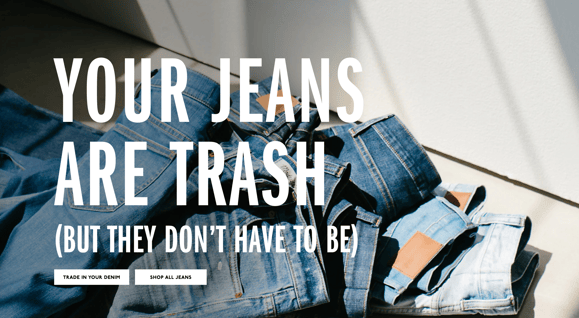
If you’re not located near a Madewell location, you can also mail in your old jeans. Learn more at the Madewell website.
unspun
Another apparel brand working to remove waste from the textiles industry is unspun, a 3D weaving technology that eliminates the cutting and sewing of flat fabric and takes yarn straight to garments.
They believe their technology has the potential to completely change the way we manufacture clothes, enabling zero-waste production and circular reuse.
In March 2024, unspun launched a pilot project with Walmart, where they are beginning the important work of creating skilled jobs in the US, meeting consumer demand for locally made garments, and bringing transparency and sustainability to the apparel supply chain.
It’s unspun’s ambition to have 3D weaving machines at microsites across the US, with a goal of 350 machines in use by 2030.
Learn more about unspun’s pilot program with Walmart.
Pact
Pact apparel partners with Fair Trade USA, Global Organic Textile Standard, and SimpliZero to create products that support both people and the planet. They choose organic farming to save water–300 million gallons and counting–and to produce clothing with fewer toxins.
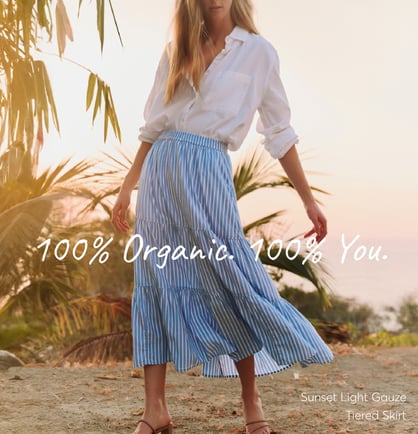
Their partnership with SimpliZero funds reforestation, renewable energy, and community projects, and their Fair Trade certification means they work with factories that provide safe working conditions.
Learn more on the Pact website.
Patagonia
Perhaps the most well-known brand for its commitment to sustainable practices, Patagonia has long publicized their environmental and social responsibility programs.
- As of 2022, 34$ of their apparel-assembly factories paid workers a living wage
- Over 85% of the products in Patagonia’s line are made in a Fair Trade Certified factory.
- 99% of the products in their Spring 2024 line are made with “preferred material input”, which includes recycled materials.
In 2022, founder Yvon Chounard donated the entire apparel brand, worth $3 million, to a trust dedicated to fighting the climate crisis. As he explained in an interview with Variety, “We’ve been giving 1% of our sales for a long time. We’ve given away $200 or $300 million over the years, but I’m always thinking, ‘What more can I do?”

Learn more about Patagonia’s commitment to the climate at their website.
Doc Martens
If shoppers needed one more reason to love Doc Martens iconic footwear, they’ve just given them one. In March of 2024, Doc Martens announced a partnership with The Boot Repair Co. to offer services ranging from sole to eyelet replacements, using the same machines, methods, and materials that are used to make brand new pairs.

Unfortunately for fans of the brand based in the US, this service is currently only available for UK-based shoppers, but if you’re interested in learning more about their sustainability goals, you can visit their website and contact them.
US-based shoppers can shop more sustainably by visiting Doc Marten’s “ReWair” section of their website where you can find refurbished second hand shoes, or learn where to trade in your old pair.
VEJA
Across the channel, French footwear brand VEJA has been running a “Clean, Repair, Collect” program since 2020. In that time, they’ve repaired 20,000 shoes from their own brand and others.
While they started locally in Bordeaux, they’ve since expanded to Paris, Berlin, and Madrid. This initiative is in line with their mission: Since 2005, VEJA has been known for creating footwear that prioritizes fair labor and sustainable use of raw materials.
Although the VEJA brand has plenty of fans here in the US, their repair service has not yet landed on our side of the pond. As more and more European-based apparel brands offer repair services, we look forward to seeing which US-based brands go to market first with these options for increasingly sustainably-minded consumers.
Rothy’s
Rothy’s decided to address the plastics problem head on with their innovative product. As their website states: The future is circular. So far, they’ve transformed over 629,000 pounds of ocean-bound plastic into the thread they use to knit their bags and accessories, and turned more than 179 million single-use plastic bottles into Rothy’s signature thread.
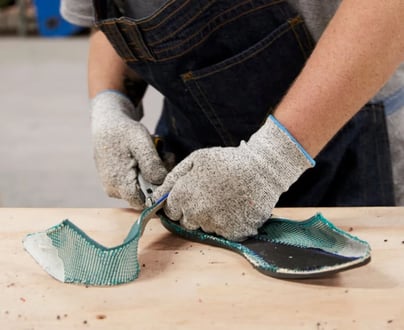
In April 2023, Rothy’s received LEED Gold and TRUE Zero Waste Platinum certifications, making them the first China-based factory to achieve this certification. You can learn more about their operations on the Rothy’s website.
Allbirds
In 2021, Allbirds launched their “Flight Plan”, measures that would help them reach their goal to cut their carbon footprint in half by the end of 2025, and get as close to zero by 2030. As of early 2024, they announced they’re over halfway towards their goal.
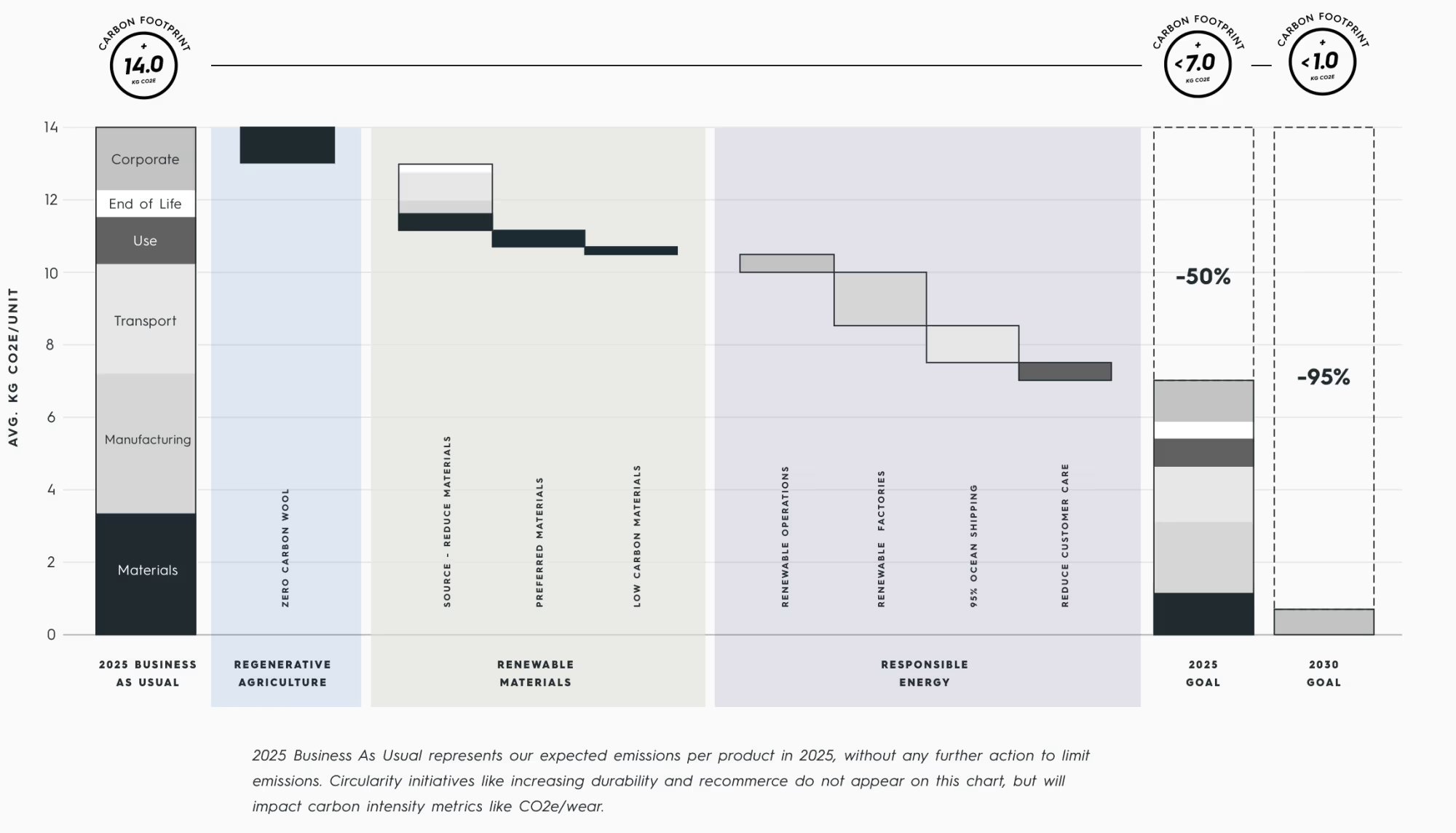
Their stated goals are many and detailed, including:
- 75% sustainably sourced natural and recycled materials
- Reduce the carbon footprint of raw materials by 25%
- Reduce raw materials use by 25% across footwear and apparel products
- Double the lifetime of footwear and apparel products
Product lifespan and durability is a key metric that longitudinal in-home product testing can help solve for.
Learn more about the company’s extensive plans for minimizing their carbon footprint on the Allbirds website.
Kidsy
This number won’t surprise parents: According to a study by What to Expect, 66% of new or expecting parents bought second hand baby gear in 2023. Younger parents were also more likely to buy used gear, too: 76% of Gen Z versus 63% of Millennial parents. (No surprise given Highlight’s own research on sustainability in consumer preferences!)
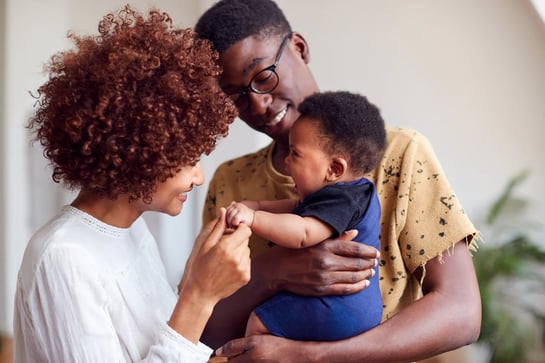
Enter Kidsy, a resale marketplace established in 2022 that sells open-box items and overstock from popular kids brands like Graco and Fisher-Price.
Clearly consumers are responding. In their first twelve months, the platform saw their revenue grow five times over as they met growing consumer demand for sustainable purchases.
Learn more about Kidsy in their interview with ModernRetail.
The Citizenry
Furniture and home goods brand The Citizenry chose their name to reflect their values. They rely on the collective input of artisans and designers across cultures and continents to create their products.
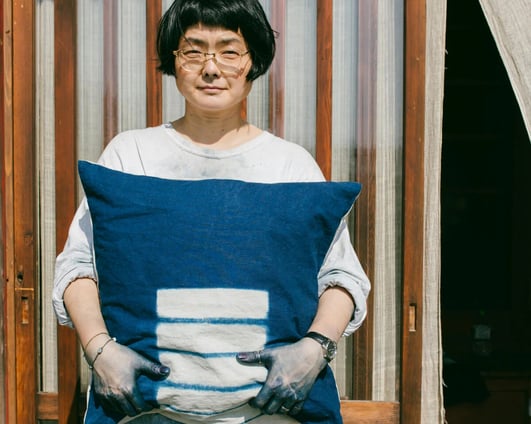
They also communicate a commitment to those artists who make their brand what it is. 100% of their products are made with a fair trade process audited by the World Fair Trade Organization. On average, they pay twice the fair trade wage requirement. They partner with almost 4,000 artisans across 23 countries–61% of whom are female.
You can learn more about how they strive to be a force for good on The Citizenry website.
Parachute
EPR, or "Extended Producer Responsibility", is becoming much more common in the CPG industry, especially in certain states where new legislation makes it mandatory. But it's still relatively rare to see retail brands taking responsibility for their products even after their lifetime with a consumer ends.
Parachute is one of the first retail, apparel, and home goods brands to play their part in building a more circular economy. They announced their "take-back" program in June of 2024 to accelerate fabric recycling for sheets, towels, pillows, and robes from any brand, in any condition (though it asks that you please launder them first).

The program marks the first time that SuperCircle, a recycling management company that partners with brands on such efforts, is helping recycle home textiles. From summer 2024, you'll be able to identify the items you want to turn in on Parachute’s website, and then you'll be given a QR code to use when you drop off the textiles at one of Parachute’s 26 locations.
Sparxell
A group of Cambridge University scientists came up with a clever idea: Nature is full of vivid colors. How can we harness those for producing plant-based pigments for cosmetics?
Together they founded the brand Sparxell, with plans to create glitter makeup, creams, sunscreens and more using plant-based cellulose–meaning they would be toxin-free and biodegradable.
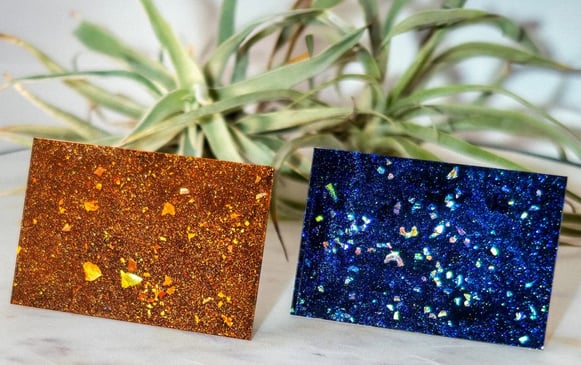
Early investors include the Circular Innovation Fund, which was co-founded by L’Oreal. You can learn more about the brand’s achievements and future plans from The Telegraph.
Ulta
Another player striving to make the beauty industry more sustainable is Ulta. They recently implemented a recycling program in partnership with Pact Collective, an organization that also works with brands like Fenty Beauty, L’Oréal and Sephora to address the industry’s packaging problem.
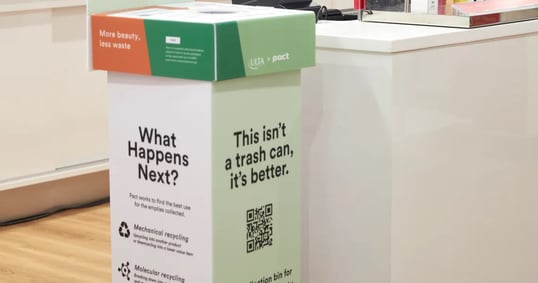
This recycling initiative called The Beauty Dropoff puts recycling bins for empty beauty packaging at all of Ulta’s 1,350 locations. It’s another part of the company’s Conscious Beauty effort, founded in 2020, that measures their impact on five criteria: clean ingredients, vegan, cruelty free, sustainable packaging and positive impact.
Learn more about Ulta’s recycling program at Retail Dive.
Rare Beauty
Rare Beauty’s 100% recyclable boxes are made from responsibly sourced, FSC-certified materials, and printed with water-based ink.
Their products are also formulated to be cruelty-free and vegan as certified by PETA’s Global Beauty Without Bunnies program. They partner with Cosmetic Good Manufacturing Practices (GMP), to ensure product safety, quality, and consistency through production, control, storage, and shipment.
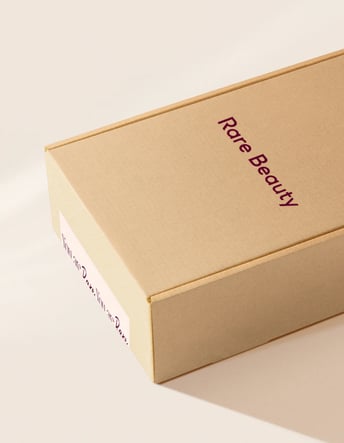
Learn more about their sustainable practices at the Rare Beauty website.
Seed
As more consumers demand toxin-free biodegradable products and packaging, more brands are responding, and Seed is the perfect example. This daily “synbiotic” (pre + probiotic) is not just good for your gut, it’s good for the planet with its glass jar and compostable mycelium tray (in other words, derived from mushrooms).
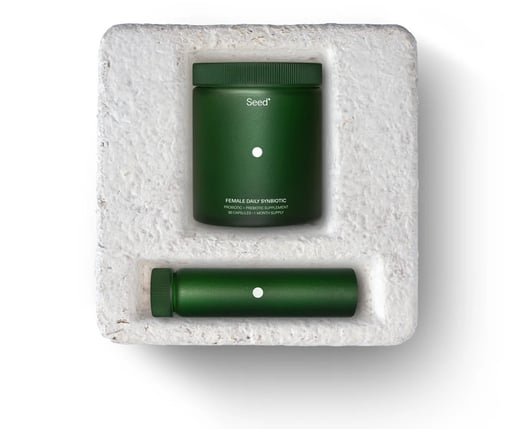
Learn more about how Seed is leading the industry in sustainable innovation in Highlight’s blog 5 Predictions for Packaging Innovations in 2024, and visit the Seed website to get all the details on the science behind their product and their commitment to sustainability.
Cabinet Health
Another wellness brand featured in Highlight’s blog 5 Predictions for Packaging Innovations in 2024 is Cabinet, a solution to the waste created by pharmaceuticals and prescriptions–over 194 billion plastic medicine bottles are produced every year. Cabinet’s refillable glass bottles set out to change that.
Clearly consumers are responding, as they’ve successfully expanded from online only to Target shelves everywhere. You can also have your prescriptions shipped to you in a home-compostable mailer.
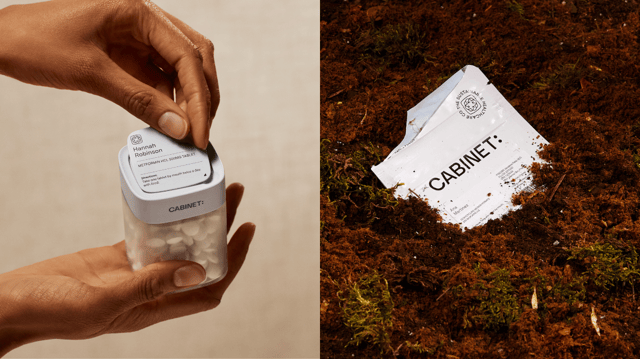
To learn more about their sustainable product and packaging model, visit the Cabinet website.
Keurig
Keurig changed the way Americans drink coffee. At the same time, though, many consumers voiced their concerns about the environmental impact they were making with daily use of plastic K-Cups.
Keurig listened to their consumers and took action. In March 2024, they began development on a new product called K-Rounds, pods that are ground, pressed and wrapped in a proprietary, protective plant-based coating preserving the coffee's flavor and aroma, eliminating the need for plastic or aluminum.
For a successful rollout, they intended to implement at home product testing with users in fall 2024. These insights will give them the data they need to refine and optimize their new plastic-free system before going to market.
Learn more about Keurig’s plans for a more sustainable K-Cup on their website.
Suri
Durables and electronics are a notoriously hard-to-recycle category, so it’s encouraging to see brands like Suri making products that can be fixed for as long a product lifespan as possible.
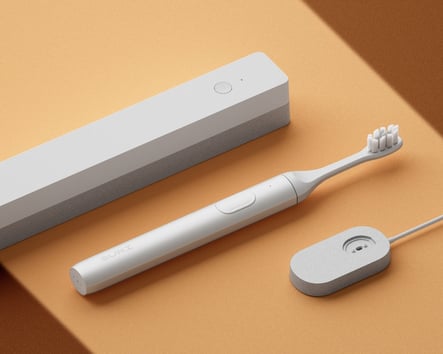
This electric toothbrush uses heads made from cornstarch with medium or soft castor oil bristles, and users can return their old toothbrush heads for free with their prepaid mailer. The components are also repairable, so you can replace the battery or fix the motor if and when they break.
Suri’s a certified B Corp that offers many different ways for their consumers to make more sustainable choices. Learn more about them on the Suri website.
Impossible
Few companies have brought vegan plant-based meat alternatives to the mainstream the way Impossible has. It’s now a staple in grocery stores all over the US.
Though their initial core consumers may have been vegetarians or vegans, Impossible is reaching more people who are simply looking to try new foods, explore better-for-you options, or decrease their environmental impact.
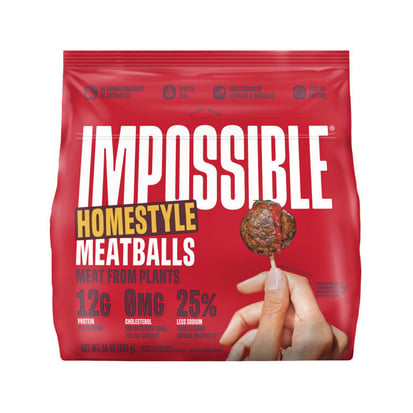
Impossible’s latest rebrand intends to communicate that “meat” can mean more than how we’ve been defining it. As Impossible CMO and CCO Leslie Sims explains, “We’re meat too, we’re just made from plants,” says. “Meat made from plants.”
Learn more about Impossible’s rebrand on Fast Company.
Bob’s Red Mill
Bob’s Red Mill has long been admired by consumers–yes, for their dedication to better-for-you products that taste great–but also for their dedication to building a better world with their business.
Their list of credentials is long. They’re Safe Quality Food and Non-GMO Project certified, they use Fair Trade certified ingredients, and they take steps throughout their supply chain to reduce carbon emissions wherever they can, for example, implementing an on-site renewable energy solar system at their manufacturing site, partnering with Ridwell to recycle packaging scrap at their mill, or removing paper lids from their Oatmeal Cups to save an estimated 170,000 pounds of waste per year.
Perhaps most admirably, the founders’ creation of the Employee Stock Ownership Plan (ESOP) in 2010 made complete transfer of ownership to their employees a reality in 2020. As Bob explained before he passed away in 2024, “Setting up an ESOP was just the right thing to do. I have people that have worked with me for over 30 years, and each and every one of them deserves this.”
Learn more about their social initiatives at the Bob’s Red Mill website.
Murphy’s Naturals
Murphy’s Naturals gets it. You don’t want to get mosquito bites, but you don’t want to use chemicals that could harm the environment, yourself, or your loved ones. That’s why this certified B Corp creates spray repellents, oils, incense, candles and more that are DEET-free but still effective.
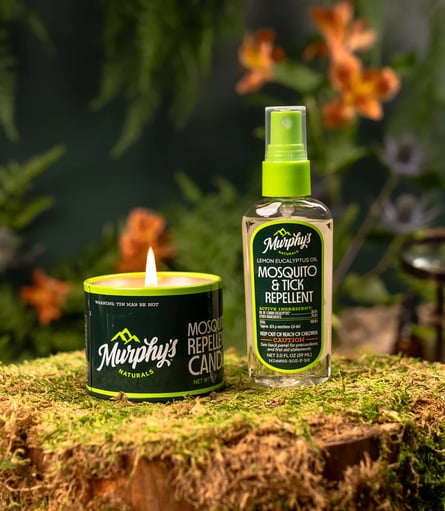
Founder Philip Freeman is a US Navy Veteran and outdoor-lover who was determined to find a way to repel mosquitoes naturally and safely. He launched the business out of his garage and named it after his dog, Murphy–just one more reason to love the brand!
You can learn more about the ingredients they use and the products they sell at the Murphy’s Naturals website.
3 Tips for More Sustainable Consumption
Doing your research on brands that take pains to make their business operations and products more sustainable is one important way to start changing the way you buy and consume. Here are five more ways to decrease your impact:
- Look for warranties: Many brands, especially appliances and other durables, come with the option or guarantee of a warranty. This way, if and when your product malfunctions, you can send it in for repairs instead of tossing it into a landfill–and this is also a great way to save money!
This is one reason why so many companies invest in at-home product testing. They can ask real consumers to use a product in multiple situations over a longer period of time, look at the effects of usage and the natural wear and tear of things like washing in laundry machines, and find ways to build more durable products.
Many brands even provide lifetime warranties such as Osprey, Jansport, Blundstone, Calphalon and more. Check out the Reddit community r/BuyItForLife to learn more.
- Buy second hand: More and more options are available for giving products a second, refurbished life. Major electronics brands like Apple offer entire second hand marketplaces for their customers. When searching on Amazon, you’ll often find the option to purchase a given product second hand. Many of the consumer brands mentioned above dedicate sections of their site to second hand products. And platforms like eBay, The RealReal, and Poshmark are only growing their user base as more and more shoppers seek out second hand items.
- Don’t buy at all: Apps like Facebook, Craigslist, Nextdoor and more make it possible to find free items in your community. The proliferation of “No Buy” groups give members the option to trade, barter, or discover people giving away used items for no cost. And, of course, there’s always the option to acquire nothing at all if it’s an object you don’t need: Check out the Reddit community r/nobuy to learn more.
Do you know of consumer brands doing important work to build better products for people and the planet that deserve a spot on this list? Reach out to marketing@letshighlight.com to let us know!
Understand what sustainability claims move the needle with in home consumer testing
Tour the Highlight Platform
Get your questions answered and see the platform in action with a personalized demo.
.png?width=1200&height=627&name=Highlight%20new%20platform%20for%20GA%20(1).png)
.png?width=1000&height=600&name=Untitled%20design%20(13).png)
![[Image] Highlight team Holiday party 2022](https://www.letshighlight.com/hs-fs/hubfs/%5BImage%5D%20Highlight%20team%20Holiday%20party%202022%20.png?width=1920&height=1080&name=%5BImage%5D%20Highlight%20team%20Holiday%20party%202022%20.png)




